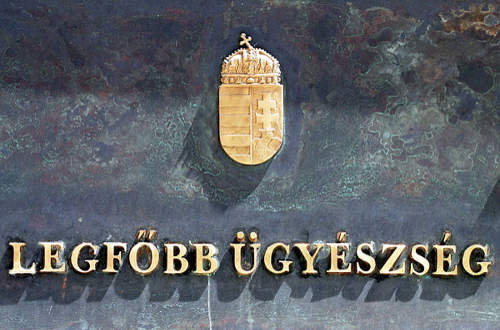|
Name |
Office of the Prosecutor General of Hungary |
|
|
Institution
|
Office of the Prosecutor General of Hungary |
|
|
Contact Details (Address) |
H-1055 Budapest, Markó Street 16. |
|
|
Webpage |
ugyeszseg.hu | |
| About the Organization | ||
|
The Office of the Prosecutor General of Hungary (hereinafter OPGH) is the supreme organ of the Prosecution Service of Hungary. The Prosecutions Service is a hierarchically structured public institution, and it is an independent constitutional organisation subject exclusively to law. [Section 3, Paragraph (1) of Act CLXIII of 2011 on the Prosecution Service]. The Prosecution Service is headed and directed by the Prosecutor General, who is elected by the Parliament for a term of nine years. The Prosecutor General and the Prosecution Service are independent, and as a contributor to the administration of justice they have the exclusive competence to enforce the state’s claim to punish crimes. Activities of the Prosecution Service are centered on two major fields: criminal law and non-criminal law activities. Accordingly, within its scope of activities the Prosecution Service prosecutes crimes and other unlawful acts or omissions, and it also assists the prevention of unlawful acts. Among its responsibilities the Prosecutor General and the Prosecution Service exercise rights in connection with investigations pursuant to statutory regulations, represent public accusations in court proceedings, supervise the legality of the execution of punishments and as the protector of public interest they exercise other functions and competences defined by the Fundamental Law and other laws. Duties, responsibilities and functions of the Prosecution Service are specified in more details by the Fundamental Law and by Act CLXIII of 2011 on the Prosecution Service. The Prosecution Service forms a separate chapter of the budget in the Act on the Central Budget. The Prosecution Service has close to 4,500 employees including prosecutors and other, non-prosecutor employees. The Prosecution Service is dedicated to the continuous training of prosecutors in various fields. The Prosecution Service also has discretionary rights to execute investigations or separate investigative actions instead of the investigative authorities originally tasked with the execution by the Code of Criminal Procedure. In some type of crimes, like the crimes against the administration of justice, the Prosecution Service has discretionary rights to conduct the investigation as an investigating authority in itself. |
||
